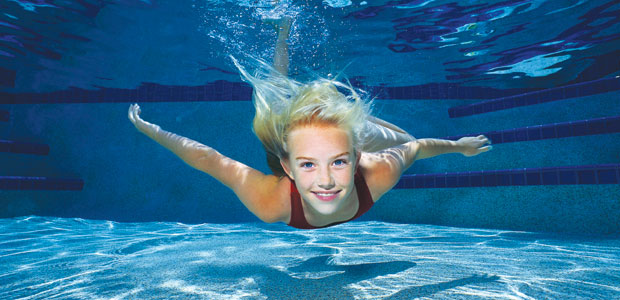Advertisement
Dive Right In
Often overlooked as a form of exercise for children, recreational swimming is an excellent all round activity. Recreational swimming is quite different from the competitive sport. Regular weekly visits to the pool can help your child reap the benefits of this most calming form of exercise. Swimming provides excellent cardiovascular training. All the major muscle … Continued

Often overlooked as a form of exercise for children, recreational swimming is an excellent all round activity. Recreational swimming is quite different from the competitive sport. Regular weekly visits to the pool can help your child reap the benefits of this most calming form of exercise.
Swimming provides excellent cardiovascular training. All the major muscle groups become engaged to help transport blood throughout the body. Other health benefits range from better posture to smoother movement to relaxation of the mind during and as a result of swimming.
Posture Perfection
The resistance that water provides helps build muscular endurance. The freestyle swimming stroke, sometimes referred to as the front crawl, exercises the upper back, specifically the latissimus dorsi muscles (the lats). In day-to-day life this group of muscles pull back the chest and shoulders and keep posture erect. You’ve undoubtedly seen people whose posture is compromised because their shoulders roll forward. Poor posture can lead to myriad problems, ranging from a sore upper back (trapezoid muscles) to low back pain, and even to a reduced ability to breathe deeply with ease.
Opening up the chest by strengthening the back muscles and creating flexibility within the chest muscles is the quickest way to improve the efficient use of the lungs. Once the lungs can draw in air with ease, each involuntary breath will be more expansive, promoting better overall health. It’s been shown that deep breathing can be a contributing factor in stress reduction. It also helps the brain stay more alert by providing more oxygen with each breath.
Fluidity of Movement
Unlike some other forms of resistance training, swimming allows both working and opposing muscles to retain their flexibility and subtleness, creating functional strength. By building muscular strength, endurance, and balance, swimming can be an ideal exercise to improve body carriage in general. In addition to developing basic flexibility, body awareness and finesse of movement are often gained. Essentially, swimming helps establish fluidity of movement.
Improved flexibility, posture, usable real-world strength, increased agility, balance, and body awareness–swimming can improve it all.
When children take swimming lessons and develop swimming skills during the formative years all the health benefits of the sport are magnified. Since children’s bodies are still forming, the benefits that swimming can provide will develop quickly, but most importantly will remain with them throughout life, with minimal effort.
Midstream Meditation
In addition to the physical gains achieved by swimming, the mental gains quite often go unappreciated. Children are inundated with nearly constant stimulation on a day-to-day basis. The solitude of being in the water can provide children with a welcome break from the world. Swimming is an opportunity to either focus on the task at hand without distraction or to enjoy the silence and let the mind wander.
Sensitivity to chlorine can be a concern for some. While most children will not exhibit any symptoms to regular chlorine exposure, others may develop a runny nose, mild headaches, and eye and skin irritation. To minimize the effects of chlorine, rinse off well after swimming and use a chlorine-removal shampoo to rinse hair.
Those who have a low tolerance to chlorine are best to swim in an ozonated pool, if possible. Ozone, equally as effective at killing bacteria, will not cause chlorine-like irritations even to more sensitive children. More and more Canadian communities are choosing to ozonate the water in their local swimming pool. Look for one near you.
Recreational swimming is a family activity that provides plenty of fun and exercise, too. Go ahead! Get wet.





